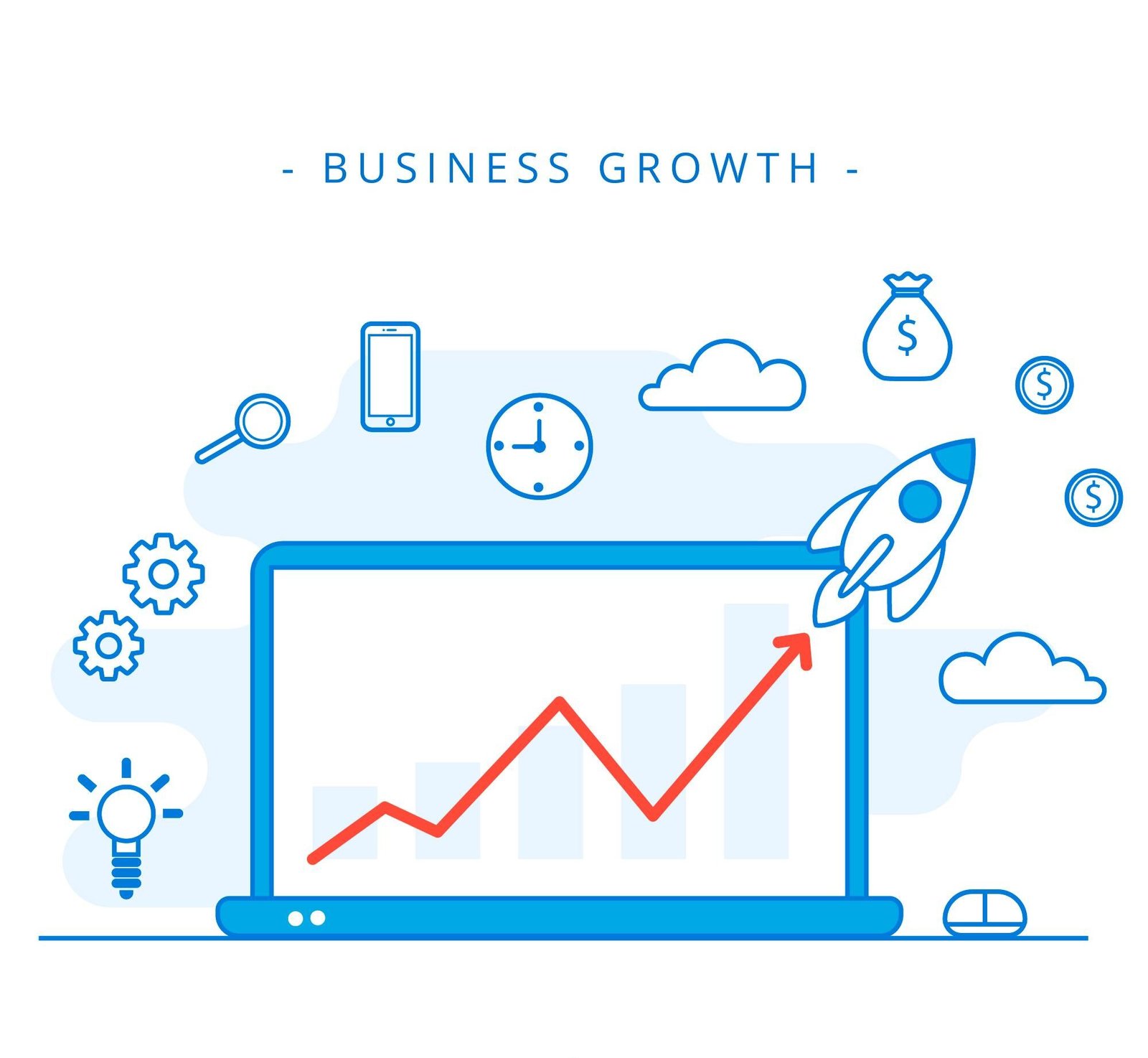Introduction: Start Your First Business Today and Understand the 4 Stages of Business Growth
Starting a business is an exciting journey, and understanding the 4 stages of a business is essential for every entrepreneur. Whether you’re looking to start your first business today or exploring different options, these stages will help you map out a clear path. The 4 stages of a business, ranging from the startup phase to growth, maturity, and eventually renewal or decline, are the key milestones you’ll need to navigate.
For example, if you’re wondering how to start a business with 5k or how to scale with 20k or 50k, each stage offers unique challenges and opportunities. Understanding the 4 stages of a business allows you to plan your finances, marketing, and team-building strategies more effectively, regardless of your starting capital.
Understanding How the 4 Stages of a Business Impact Your Strategy
As you start your first business today, you’ll need to plan your actions according to these stages. From the startup phase, where you’re focused on laying a strong foundation, to the growth phase, where scaling becomes a priority, each stage requires different tactics and financial strategies.
Can You Start Your Business with Limited Funds?
It’s possible to start a business with 5k or 20k if you know how to allocate resources wisely. Early stages often demand a lean approach, focusing on high-impact activities that will drive growth while keeping expenses manageable.
What Are the 4 Stages of Business Growth?

Understanding the 4 stages of business growth is essential for every entrepreneur. These stages are the foundation of your business’s journey, helping you understand where you are and what strategies are required to move forward. The stages typically include the startup phase, the growth phase, the maturity phase, and the renewal or decline stage.
In the startup phase, you’re laying the groundwork for your business, building your brand, and ensuring you have a clear path to revenue. The growth phase involves expanding your customer base, scaling operations, and increasing profits. The maturity phase requires strategic management to maintain market share, while the renewal or decline phase challenges you to innovate or pivot to avoid stagnation.
How the 4 Stages of a Business Impact Your Strategy
Each of the 4 stages of a business presents different challenges and opportunities. Understanding these stages allows you to tailor your approach, from resource allocation to marketing strategies, to ensure success at every step.
Planning Your Approach in the Early Stages
In the early stages, it’s essential to focus on building a solid foundation. Starting with a clear business plan and an understanding of the 4 stages of business growth will help you navigate challenges and opportunities as your business evolves.
Stage 1: The Startup Phase
The startup phase is where every business begins. During this stage, your primary focus is on establishing a strong foundation for your business. This includes developing your product or service, defining your brand, and acquiring your first customers. You’ll also need to address key questions like how to start a business with 5k or how to budget your limited resources effectively.
At this stage, cash flow can be tight, and every decision you make will have a lasting impact. It’s crucial to focus on creating a clear business model, establishing a strong online presence, and setting realistic goals. Most importantly, understanding that this phase is about survival and learning will set you up for success as you move to the next stage of the 4 stages of a business.
How to Survive the Early Stages of Your Business
It’s important to manage cash flow carefully when you’re in the startup phase of the 4 stages of a business. This phase often involves small budgets, so knowing how to start a business with 5k or start a business with 20k will help you make smarter financial decisions.
Setting Realistic Milestones for Growth
In the startup phase of the 4 stages of a business, it’s vital to set achievable milestones. These milestones will act as stepping stones to progress your business toward the growth phase and will help you measure your success and adapt accordingly.
Stage 2: The Growth Phase

The growth phase of a business is where things begin to accelerate. At this stage, you’ve successfully laid the foundation in the startup phase, and now it’s time to expand. This phase is all about scaling up—whether it’s increasing your customer base, hiring employees, or expanding your product offerings. You may be wondering how to start a business with 50k or start a business with 100k, and this is where you begin making more significant investments to propel your growth.
Managing cash flow becomes more complex as you expand, so careful planning and resource allocation are key. The growth phase requires strategic decisions, such as investing in marketing, improving operational efficiency, and hiring the right talent to support your growing business. Understanding the 4 stages of a business and where you stand will help you make better financial and operational decisions.
Scaling Your Operations for Long-Term Success
To succeed in the growth phase of the 4 stages of a business, focus on building systems that will help you scale your business efficiently. This is also the time to optimize your marketing strategies and increase brand awareness.
Investing in Talent and Infrastructure
As your business grows, you will need to invest in your team and infrastructure. Hiring the right employees and developing your internal processes will help you handle the increased demand and continue to scale your operations effectively in the growth phase of the 4 stages of a business.
Stage 3: The Maturity Phase
The maturity phase is when your business has established itself in the market, and you are enjoying stable revenue and consistent operations. However, this stage presents its own challenges, as businesses often face market saturation or increased competition. At this point, it’s important to focus on maintaining your position and maximizing profitability.
In the maturity phase of the 4 stages of a business, you may be looking for ways to optimize operations and introduce new products or services to keep your brand fresh. Many businesses also explore ways to start a business with 50k or 100k at this stage by expanding to new markets or diversifying their offerings. The key to success in this phase is to keep innovating while maintaining your core values and services.
Maximizing Profitability in the Maturity Phase
During the maturity phase of the 4 stages of a business, focus on refining your business processes to reduce costs and maximize efficiency. This will allow you to maintain profitability even in a competitive market.
Expanding to New Markets or Products
In the maturity phase, exploring new opportunities, whether through new products, services, or markets, can help you sustain growth and remain relevant. This could mean expanding your business internationally or launching complementary products that appeal to your current customer base.
Stage 4: The Renewal or Decline Stage

The final stage of business growth is the renewal or decline stage. This phase occurs when a business faces stagnation, or the market dynamics shift in a way that threatens its long-term sustainability. In some cases, businesses must innovate or pivot to avoid decline, while others might experience a phase of renewal with a revitalized strategy, product offerings, or business model.
If you’re in this phase, it’s crucial to assess your business operations and decide whether a renewal strategy is needed or whether it’s time to exit. Whether you have the capital to start a business with 50k or need to make difficult decisions, understanding the 4 stages of a business helps you evaluate your options and make informed choices to maintain relevance in an ever-changing market.
Adapting Your Business Model for Renewal
In the renewal phase of the 4 stages of a business, businesses that survive are often those who innovate. Updating your business model, adopting new technologies, or entering a new market can revitalize your company and push it into another growth cycle.
Managing Decline and Exploring Exit Strategies
For businesses in the decline phase, it’s important to explore exit strategies or drastic pivots that could potentially save the company. Understanding your options—whether it’s selling the business or rebranding—is crucial during this phase of the 4 stages of a business.
Managing Cash Flow Through the Growth Stages
Cash flow management is crucial for businesses at every stage of growth, but it becomes especially important during the startup and growth phases. During these stages, it’s essential to manage your cash flow efficiently to avoid running into financial difficulties. This includes balancing income and expenses, securing enough capital to sustain operations, and ensuring you have the resources to handle unexpected expenses.
If you are wondering how to start a business with 20k or start a business with 5k, managing your cash flow wisely will help you make the most of your limited resources. Properly managing cash flow allows you to focus on scaling the business without worrying about running out of funds. If you’re also considering flexible work opportunities, check out our post on 11 of the Best Work from Home Jobs in 2025 for additional income options that could support your entrepreneurial journey.
Cash Flow Tips for the Startup Phase
In the startup phase of the 4 stages of a business, you’ll need to make every dollar count. Tight budgeting, securing initial investments, and controlling overhead expenses are essential for survival and growth.
Investing for Future Growth
As you enter the growth phase of the 4 stages of a business, it’s important to reinvest profits back into the business. This could mean expanding your marketing efforts, increasing inventory, or investing in new technologies to streamline operations.
Building a Strong Team for Every Stage
A strong team is the backbone of any successful business. Whether you’re in the startup phase, growth phase, or maturity phase, assembling the right team is crucial for ensuring your business operates efficiently and effectively. As your business evolves, so too will the roles and responsibilities of your team.
During the startup phase, you might start small, with a few key individuals who can wear multiple hats. As you start your first business today, focusing on hiring the right talent will help you build a solid foundation. In the growth phase, it becomes essential to hire specialized roles to scale your business efficiently. In the maturity phase, you’ll need to focus on retaining top talent and fostering a company culture that aligns with your values.
Hiring the Right People in the Early Stages
In the startup phase of the 4 stages of a business, prioritize hiring versatile individuals who can contribute to various aspects of the business. Their ability to adapt and take on different roles will help you get your business off the ground quickly.
Expanding the Team for Growth
During the growth phase of the 4 stages of a business, it’s important to start building a larger, specialized team. Look for individuals with expertise in areas such as marketing, sales, and finance, who can help your business scale and manage its increasing complexity.
How to Adapt Your Marketing Strategy at Each Stage
Your marketing strategy must evolve along with the business as it progresses through the 4 stages of business growth. The marketing tactics that work in the startup phase might not be as effective in the growth or maturity phases. Adapting your marketing efforts to each stage ensures that you reach your target audience and maintain steady growth.
During the startup phase, your primary goal is to establish brand awareness and attract your first customers. As you move into the growth phase, you’ll need to focus on expanding your reach and scaling your marketing efforts. In the maturity phase, refining your customer engagement strategies and building long-term loyalty become your priorities.
Marketing in the Startup Phase
In the startup phase of the 4 stages of a business, focus on cost-effective marketing methods like social media, word-of-mouth, and building relationships with early customers. These strategies are crucial for building a solid customer base with limited resources.
Scaling Your Marketing Efforts for Growth
Once you reach the growth phase of the 4 stages of a business, invest in scalable marketing strategies like paid advertising, content marketing, and influencer partnerships. Expanding your marketing efforts will help you reach a wider audience and increase sales.
Managing Risks as Your Business Evolves
Every business faces risks, and managing these risks is crucial as your business grows. During the startup phase, the risks are usually related to market uncertainty, financial constraints, and lack of brand recognition. As your business progresses through the growth and maturity phases, new risks emerge, such as competition, operational inefficiencies, and market saturation.
To manage risks effectively, it’s essential to stay agile and proactive. Whether you’re working with a small budget and wondering how to start a business with 5k or scaling with a larger investment, understanding the risks at each stage of the 4 stages of a business helps you make informed decisions and protect your business from potential pitfalls.
Identifying Risks in the Early Stages
During the startup phase of the 4 stages of a business, focus on identifying and mitigating risks such as financial mismanagement and poor customer acquisition strategies. Early risk management will help you build a solid foundation for the future.
Mitigating Risks During the Growth Phase
As your business enters the growth phase, the risks become more complex. Managing these risks requires careful planning, such as diversifying revenue streams, improving operational efficiency, and keeping a close eye on market trends. Understanding the risks in each of the 4 stages of a business allows you to pivot and adjust when necessary.
Importance of Market Research Throughout Business Growth

Market research is critical at every stage of business growth. Whether you’re in the startup phase, growth phase, or maturity phase, understanding your market, customers, and competition will help you make informed decisions. During the startup phase, market research helps you identify your target audience and validate your business idea. As your business grows, you’ll need to conduct more advanced market research to adjust your strategies and stay ahead of the competition.
For example, when deciding whether to start a business with 50k or start a business with 100k, conducting thorough market research can provide valuable insights into where to invest your resources for maximum return. In the maturity phase of the 4 stages of a business, market research helps you stay relevant by tracking market trends and customer preferences.
How Market Research Helps in the Startup Phase
During the startup phase of the 4 stages of a business, market research helps you test your product idea, identify potential customers, and determine pricing strategies. This research will guide your early decisions and improve your chances of success.
Adapting Market Research for Growth
As you enter the growth phase, market research becomes more focused on understanding customer behavior, monitoring competitors, and identifying new opportunities for expansion. This data will inform your scaling strategy and ensure your business remains competitive through each phase of the 4 stages of a business.
Conclusion: Planning for Long-Term Success and Sustainability
Reaching long-term success and sustainability requires careful planning, adaptability, and a thorough understanding of the 4 stages of a business. Each stage presents unique opportunities and challenges, and by managing risks, finances, and marketing strategies, you can ensure your business thrives through its growth phases. Whether you’re ready to start your first business today or scale an existing one, understanding the entire growth journey is essential.
With the right mindset, resources, and team, you can successfully navigate the startup, growth, maturity, and renewal or decline phases. Don’t forget to continuously invest in market research, cash flow management, and innovation to maintain your business’s competitive edge and achieve long-term success.
To understand how your business evolves over time, it’s important to study the organizational life cycle. The stages from creation to termination will provide critical insights for long-term planning. You can learn more about this cycle in our article on Organizational Life Cycle.
Building a Foundation for Future Growth
Starting with a strong foundation in the startup phase and managing your cash flow, marketing, and team effectively will help you reach the growth and maturity phases. Focus on long-term sustainability by planning and adapting as your business evolves through the 4 stages of a business.
Commit to Continuous Learning and Adaptation
The key to lasting business success is continual learning and adaptation. Be proactive in evolving your strategies to meet the demands of each phase, and your business will be positioned for success well into the future.

